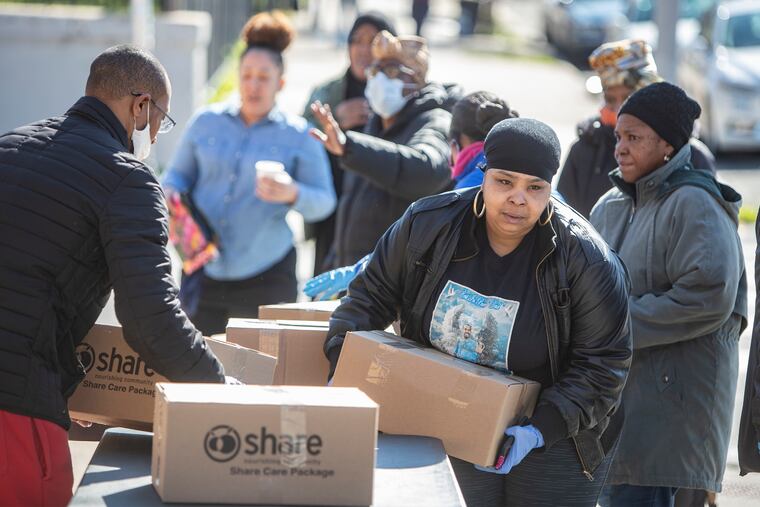Nearly $1.4 billion needed in extra resources to feed the hungry nationwide over the next 6 months, agency says
School closures and rising unemployment could result in an estimated additional 17.1 million people experiencing hunger, an increase of 46%, according to Feeding America, which operates 200 major food banks across the U.S., including Philabundance in this region.

As need spikes and food supplies dwindle, the nation’s largest domestic hunger-relief agency said it faces a potential $1.4 billion shortfall in resources over the next six months because of the coronavirus pandemic.
The alert comes from Feeding America, a network of 200 major food banks across the United States, including Philabundance in this region.
School closures and rising unemployment could result in an estimated additional 17.1 million people experiencing hunger, an increase of 46%, according to Feeding America officials.
They said in a statement: “The situation is becoming more dire as food donations to the Feeding America network are in decline due to increased consumer demand and supply-chain challenges, including decreased food donations from manufacturers and grocery retailers.”
Beyond that, Feeding America said, food banks have lost 60% of the volunteers who typically package and deliver food. Many are senior citizens, who are said to be at greater risk of COVID-19.
The charitable food system in the United States is being confronted by a “perfect storm," the officials said, "with surges in demand, declines in food donations and volunteers, and disruptions to normal operating procedures.”
Claire Babineaux-Fontenot, CEO of Feeding America, added, “It is all of our neighbors who now more than ever need help putting food on their tables.”
Locally, the food supply chain “has a big kink in it right now,” said Sam Retamar, public relations associate at Philabundance, which normally supplies food to 350 pantries in the Philadelphia area and South Jersey. Residents are over-buying food in stores such as Acme Markets, which donates extra food to the agency, an Acme official said.
“The average citizen is in such a panic,” Retamar said. “Their habits are putting a hindrance on the safety net.”
The need is growing, she said, although she is not yet able to quantify it. But, she added, if the pandemic goes on for four more months, “we could definitely be in trouble. To even say that out loud is scary, but we are doing our best.”
Various organizations — including the 76ers and the Flyers, which donated $250,000 each — have been sending money to help Philabundance. More financial donations are needed, agency officials said.
The pandemic is causing Americans to change the kind of food they eat, and it’s affecting pantries for low-income people everywhere.
“Overnight, an entire country’s buying habits have dramatically shifted,” said George Matysik, executive director of the Share Food Program, the largest charitable food agency in the region, which supplies 500 pantries.
“Produce is not being purchased. People are buying mostly shelf-stable, dry products in stores" to allow supplies to last longer, he said. "You’re seeing an 80% increase in people buying beans and rice. And we have to shift very quickly to accommodate that change.”
As a result, Matysik said, Share has to pay from 30% to 40% more to get dry goods, since supermarkets that would normally donate the products are running out.
On the other hand, he said, Share is able to pick up excess produce. “We are getting a ton of mushrooms from Kennett Square growers, and tons of grapes from the Port of Philadelphia,” Matysik said. “It’s great, but it would help if people would stop hoarding in supermarkets. Our needs are huge, but we can only measure it anecdotally at this point. For now, it’s rapid-response time.”
That need is filtering down to Philadelphia neighborhoods, said Linda Gerald, who runs the Peniel Baptist Church food pantry in Brewerytown.
Interestingly, she said, the pantry had been seeing fewer clients before the coronavirus hit. “This area is gentrifying, and we weren’t needed as much,” said Gerald, a former Philabundance volunteer.
But since the virus spread, she added, “the number of our clients doubled from 30 to 60.”
Asked whether she was worried that the food will run out, Gerald said simply, “I know the Lord will supply. I don’t have a fear.”